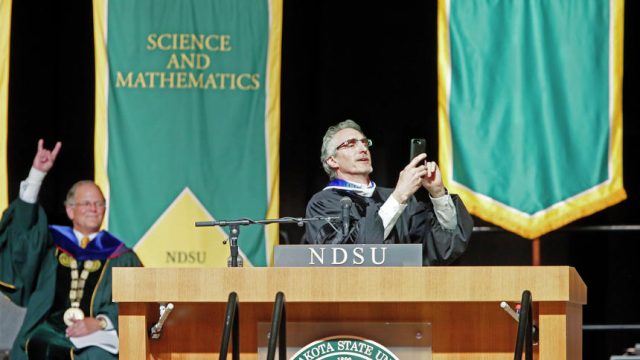Burgum May Be a Threat to the Status Quo in Higher Education and That’s a Very Good Thing

North Dakota Governor Doug Burgum does a live Snapchat video as NDSU President Dean Bresciani flashes the Bison horns during the afternoon commencement address at graduation ceremonies from the Fargodome on Saturday, May 13, 2017. David Samson / The Forum
Governor Doug Burgum delivered a commence address to graduates at North Dakota State University this weekend.
Prior to the speech faculty at the university expressed anxiety about his policy agenda for higher education in our state. They were right to be anxious, I think.
He concluded his address urging courage.
“Courage to challenge the status quo, courage to challenge existing power structures because sometimes these power structures exist only to defend themselves and their past, rather than participating in reinventing themselves to define and create our collective future,” he said.
The message was intended for the students, but he may as well have been talking to the belligerently entrenched faculty, administrators, and politicians who seem to think that we should be serving our state’s institutions of higher education as opposed to those institutions serving us.
At least, that’s how I took the governor’s remarks. I look forward to hearing him explain more.
[mks_pullquote align=”right” width=”300″ size=”24″ bg_color=”#ffffff” txt_color=”#000000″]”No organization, regardless of its prior longevity, nor its traditions, nor its power base, will be immune to the forces of change,” Burgum told the graduates. Change is coming, in other words, whether we like it or not.[/mks_pullquote]
The priorities pursued by many of our state’s universities have been completely backward. The goal of providing students with a valuable education they can deploy in pursuit of their careers has taken a backseat to bloated sports programs and local economic interests. When university leaders push for enrollment growth at their institutions it’s not about serving the students. It’s about justifying bigger campuses, bigger budgets, and driving more commerce into local economies.
After all, more students means more apartments rented. More pizzas delivered. More purchases at stores.
While our university leaders have been building their little empires the reality of education has shifted under their feet. College degrees are becoming less important to employers than things like skills and experience. Google, for instance, doesn’t put a lot of emphasis on degrees. Companies like that just want people who can do things, and these days you can learn to do a lot of things outside of the traditional college experience.
Which isn’t to say that degrees are worthless, or a thing of the past. Only that they’re treated differently in the modern economy. I’m not sure our state’s institutions, or their defenders, understand that yet.
“No organization, regardless of its prior longevity, nor its traditions, nor its power base, will be immune to the forces of change,” Burgum told the graduates.
Change is coming, in other words, whether we like it or not.
I’m excited to learn more about Burgum’s vision for adapting to that change. If I had my way we’d close several of the state’s public campuses, end the millions of dollars in subsidies to the sports programs, slash and burn programs which are duplicated within the university system, and refocus those resources on serving the students in pursuit of skills and knowledge they can use in careers.
Particularly those careers which might keep them in North Dakota.
But I am an apostate to the world of higher education. A philistine who cares very little for burnishing the glory of any given institution, or operating colleges to stimulate business for landlords and restaurant owners. I believe there’s nothing wrong with students expecting some return on investment for the time and money they spend on pursuing their educations. I believe the true measure of success in higher education is not sports championships or enrollment size or the number of buildings on campus but rather how many students are able to use the education they received to prosper.
Maybe Burgum feels that way too.
If he does, I hope he’s ready for a fight to implement that vision, because there are powerful people with deep emotional and financial roots in the status quo.




